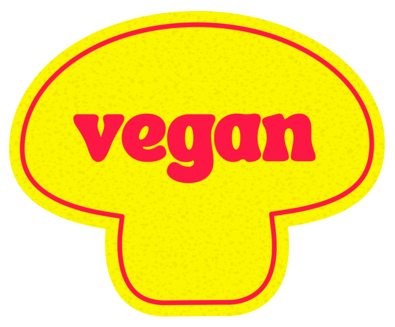Why Mushrooms?
Like most vegetables, mushrooms contain protein, fiber, vitamins, minerals, and antioxidants, all of which play a major role in our health. However, mushrooms are unique in that they have one of the highest levels of protein content of common vegetables, but also one of the lowest levels of calories and sodium. Additionally, they have many other properties that other common vegetables simply do not have (or have very low levels of), like Vitamin B12, Vitamin D, Selenium, Lentinan, Beta-glucan, Chitin, Ergothioneine, Niacin, Riboflavin, and Copper. This means that mushrooms offer not only the same general nutritional benefits of common vegetables, but also have distinct advantages that make them a fantastic addition to a healthy, vegan friendly diet.
Vitamin B: Vitamin B helps the body metabolize food, promotes healthy brain function, and helps form red blood cells. It is produced in meaningful doses by animals and not plants, making mushrooms one of the few vegetarian options available. (Healthline)
Vitamin D: Vitamin D is responsible for helping the body absorb calcium to build and maintain healthy bones, and supporting the immune system. Vitamin D is very rarely naturally occurring in foods (animals or plants), making mushrooms one of the few vegetarian options available. Vitamin D deficiency has been cited as a major problem in the medical community over the past decade, as various studies have shown it to be linked to colon and breast cancer, bone loss, depression, hair loss, and muscle pain. (Healthline)
Selenium: Mushrooms have the highest quantity of the mineral Selenium of all fruits and vegetables, which is very rich in antioxidants that have anti-inflammatory properties and can help the body fight free radicals. (Healthline)
Lentinan & Beta-glucan: According to the National Cancer Institute and Memorial Sloan Kettering, the abundant antioxidant content in mushrooms from sugar molecules like Lentinan and Beta-glucan may help prevent breast, prostate, lung, and other types of cancers. A 2010 study published in Experimental Biology and Medicine supports this claim, where it found that maitake, crimini, portabella, oyster and white button mushrooms all demonstrated the ability to significantly suppress breast cancer cell growth. Additionally, a large study of 36,000 men in Japan found that those who ate mushrooms three or more times per week had a 17% lower chance of developing prostate cancer. (MSKCC.org and Cancer.gov)
Chitin: Chitin is a fibrous substance consisting of polysaccharides and forming on the cell walls of fungi. Chitin acts as an insoluble fiber, meaning it cannot be broken down in the human digestive system. Studies have demonstrated that Chitin has the ability to induce the growth and activity of healthy bacteria in our gut, which not only helps the digestive system to utilize food more efficiently, but also supports the health of other major systems in the body including the heart, kidney, and brain. (Healthline and nih.gov)
Ergothioneine: Ergothioneine is a naturally occurring amino acid in fungi and particularly mushrooms. The compound has been shown to be a very effective antioxidant that helps combat inflammation and oxidative stress in neurodegenerative, lung, and liver diseases. These qualities also make it a natural anti-aging compound, where there are numerous recent and ongoing studies evaluating its efficacy in this area. (Healthline, Sciencedirect.com, and nih.gov)
Niacin: Niacin is a member of the B-Vitamin family that helps convert food into energy by aiding enzymes, specifically the NAD and NADP coenzymes that are involved in cellular metabolism. Additionally, it plays a role in cell signaling and making and repairing DNA, in addition to acting as an antioxidant. (Healthline)
Riboflavin: Riboflavin is also a member of the B-Vitamin family that has been widely studied for antioxidant, anti-aging, anti-inflammatory, anti-nociceptive and anti-cancer properties. Findings have shown that it can help protect against various medical conditions like sepsis, ischemia, and cancer. (Healthline and nih.gov)
Copper: Copper is a mineral that has a number of important functions in the body, including aiding production of red blood cells, regulation of blood pressure, maintenance of bone, heart, and brain functions, and activation of the immune system. Studies have also shown that Copper might be a natural treatment for neurological diseases and certain forms of cancer. (Healthline, nih.gov (1), and nih.gov (2))

















